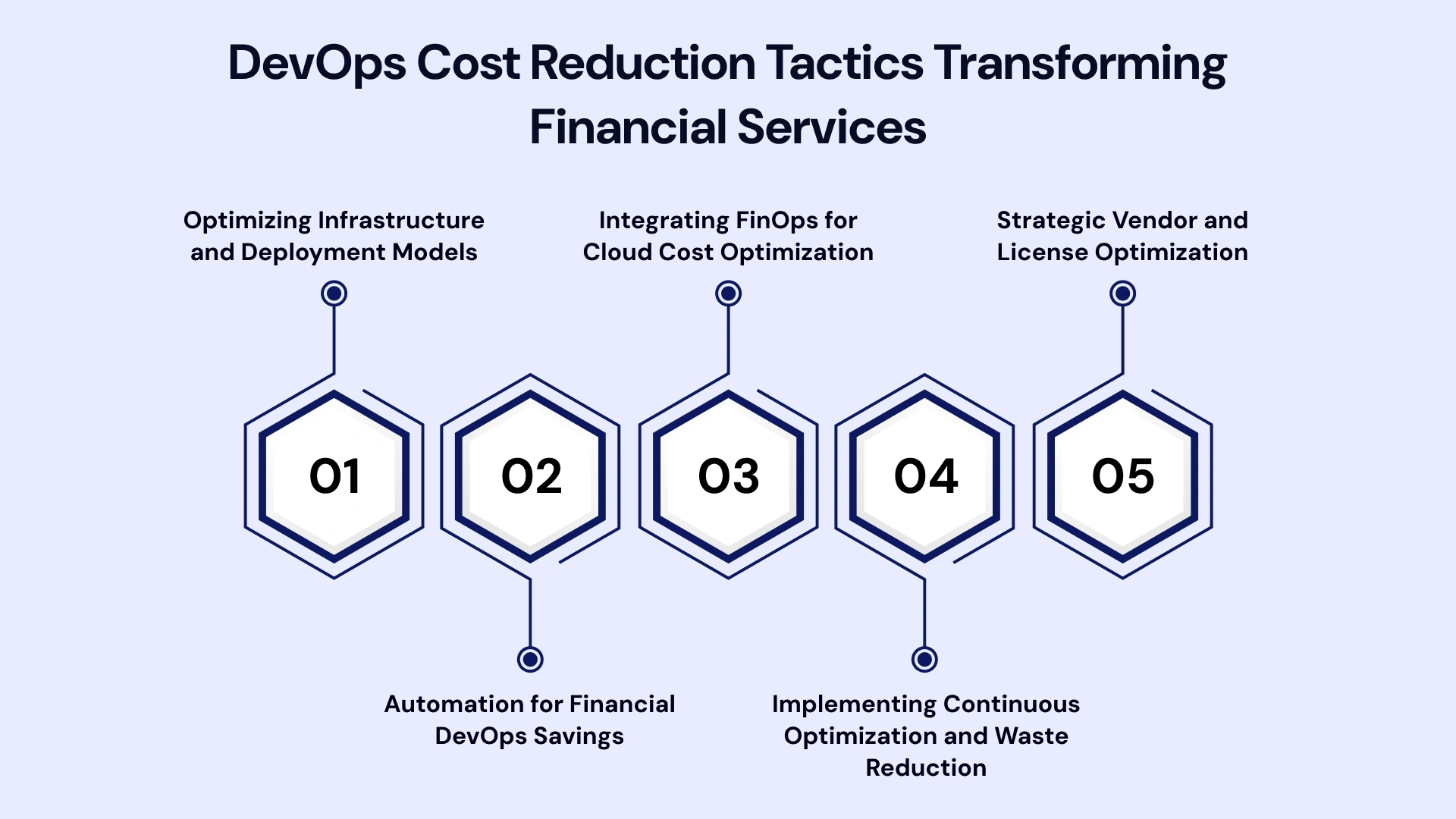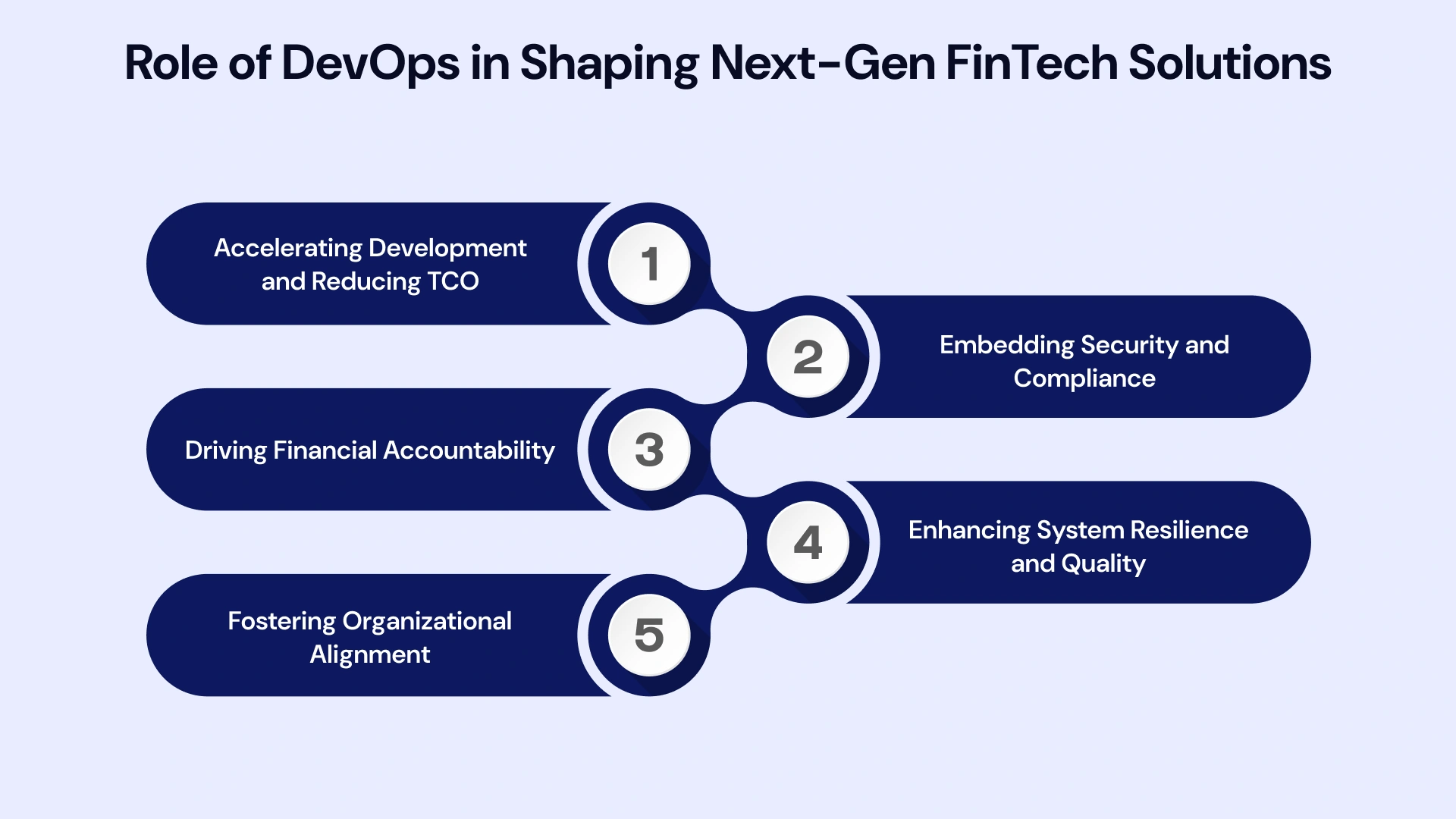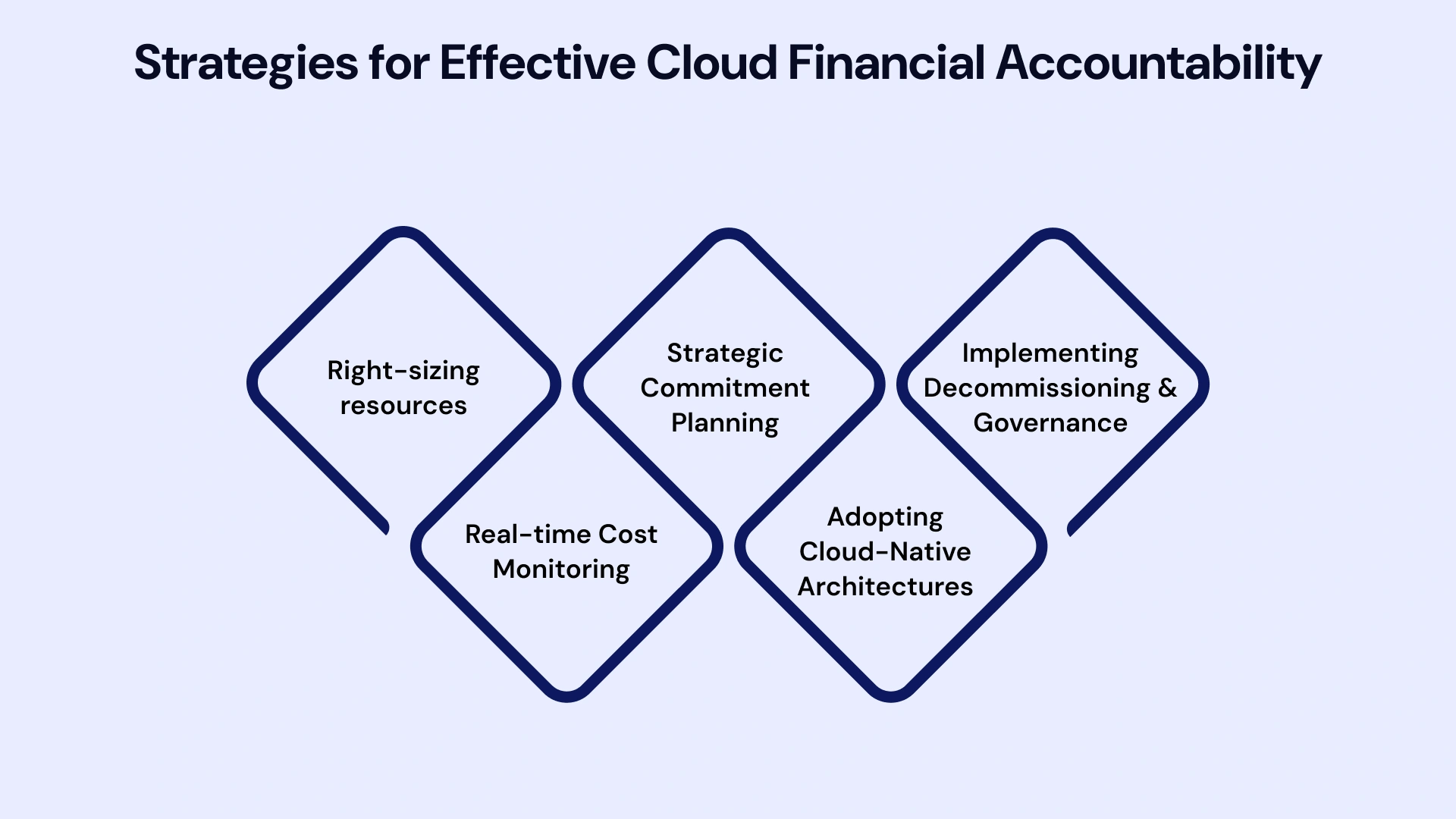The financial industry is under increasing pressure to optimize costs while maintaining compliance, accelerating digital transformation, and ensuring seamless customer experiences. The imperative for change isn't just about growth; it's about survival and competitive edge.
This clearly demonstrates the urgent relevance of DevOps cost optimization finance today.
By integrating development, operations, and compliance frameworks such as DevSecOps and FinOps, banks and financial institutions can actively control IT budgets, automate resource utilization, and ensure maximum ROI on technology investments.
The convergence of these practices is not a trend but a foundational shift toward a more financially accountable and operationally efficient IT model. In this in-depth blog, we’ll explore the crucial role of DevOps in FinTech applications, specific strategies for optimizing infrastructure and deployment, and how the powerful collaboration between DevOps and FinOps is working together to transform cost management in the BFSI sector.
Why DevOps Cost Optimization Finance Matters Today
Financial institutions operate in a highly regulated, security-sensitive, and cost-intensive IT environment. Traditional, siloed IT operations often result in higher infrastructure expenses, unused cloud resources, and excessive overhead during compliance audits. This legacy approach is simply unsustainable in a world dominated by agile fintech competitors.
The financial sector's current challenges are a direct catalyst for adopting robust DevOps cost optimization finance strategies:
- Mounting Cloud Infrastructure Expenses with underutilized resources, leading to 'zombie' infrastructure that drains budgets without providing value.
- Increasing DevOps implementation costs for banks adopting large-scale automation and cloud-native technologies requires a clear ROI roadmap.
- Rising regulatory compliance costs, particularly around DevSecOps in financial services, which demands constant, auditable security integration.
- Pressures from fintech disruptors offering leaner, agile solutions built on optimized, cloud-native architectures.
- Growing customer demand for digital-first banking experiences necessitates scalable, cost-efficient systems that can handle rapid and unpredictable load increases.
By adopting strategic DevOps Consulting Services, financial software development companies enable banks, insurance firms, and capital markets to achieve higher cost savings through DevOps automation in finance, while aligning with stringent compliance benchmarks. This strategic partnership ensures that technological adoption translates directly into fiscal responsibility and improved customer experience.
Key Strategies for DevOps Cost Reduction in Financial Services
Achieving deep DevOps cost reduction in financial services requires a multifaceted approach that targets waste across infrastructure, deployment, and management processes. These strategies are the bedrock of a financially accountable IT department.

Optimizing Infrastructure and Deployment Models
Effective DevOps infrastructure cost management ensures the right-sizing of cloud resources, eliminating wastage from over-provisioning. Implementing advanced monitoring tools, such as Prometheus, Grafana, or Azure Monitor, provides granular visibility that is crucial for preventing budget overruns.
- DevOps pricing models in financial services, such as 'pay-as-you-go' cloud services combined with reserved or spot instances, provide granular cost control. This ensures IT budgets are aligned with actual, measurable workloads, moving away from expensive, fixed capacity planning.
- Banks that leverage robust DevOps cloud migration cost control approaches often attain 15–20% savings by eliminating overprovisioned on-premises hardware and optimizing cloud resource allocation post-migration.
Automation for Financial DevOps Savings
The most direct path to sustainable DevOps cost reduction in financial services is through automation. The cost savings with DevOps automation in finance are driven by highly efficient CI/CD pipelines that automate testing, risk assessment, and deployment.
- Automated monitoring and self-healing systems significantly reduce operational overheads, minimizing the need for manual intervention. This is particularly vital for streamlining compliance checks using DevSecOps best practices in the BFSI sector.
- For instance, a leading Canadian bank applied significant financial savings through DevOps automation by automating 70% of its testing pipeline, which not only accelerated delivery but also reduced manual QA costs by 35%. This is a powerful demonstration of the DevOps ROI optimization for financial institutions.
Integrating FinOps for Cloud Cost Optimization
FinOps for financial institutions emphasizes financial accountability in cloud usage, making every engineering team a steward of the IT budget.
- FinOps vs DevOps in financial services is not a competition but a powerful collaboration. FinOps focuses on financial tracking, planning, and optimization, while DevOps focuses on automation, delivery, and velocity. Together, they create a culture where engineers understand the economic impact of their architecture decisions.
- Many institutions are now implementing FinOps in BFSI sector environments to gain granular visibility into spend and promote shared responsibility between engineers, finance leaders, and product owners. This leads to more disciplined cloud FinOps in the banking sector.
Implementing Continuous Optimization and Waste Reduction
A core element of sustained DevOps cost optimization finance is moving beyond one-time savings to continuous expenditure scrutiny. This involves perpetually auditing resource usage and proactively decommissioning unused or underutilized environments.
- Mandatory tagging policies for cloud resources (e.g., tagging by project, department, or cost center) are critical for accurate cost allocation and identifying "shadow IT" or wasted resources. This practice supports effective DevOps cost management for finance industry reporting.
- By refactoring legacy applications into serverless functions or containers (such as Kubernetes), financial firms can pay only for the compute time consumed, drastically reducing IT costs with DevOps in finance compared to maintaining perpetually running virtual machines.
Strategic Vendor and License Optimization
Software licensing and vendor relationships represent a significant, often hidden, portion of the DevOps total cost of ownership (TCO) in finance. Strategic management of these costs can yield substantial, non-infrastructure-related savings.
- Consolidating tool licenses and transitioning to subscription models where possible prevents multiple teams from independently purchasing duplicate software, which is crucial for banks with high DevOps implementation costs.
- Prioritizing high-quality, open-source tools that are supported over proprietary software; especially for automation components, is a direct way to reduce recurring license fees. This forms a strong part of a cost-efficient DevOps budget planning for financial institutions.
The Role of DevOps in FinTech Applications and Innovation
DevOps has fundamentally revolutionized Financial Software Development Services, particularly in the rapidly evolving fintech space. For modern financial institutions aiming for market leadership, the synergy of agile product launches, rapid iteration cycles, and security-aligned workflows is proving absolutely critical. The speed and security DevOps provides are direct inputs into revenue generation, enhanced compliance, and cost control.

Here are the five core roles DevOps plays in FinTech innovation and DevOps cost reduction in financial services:
1. Accelerating Development and Reducing TCO (The Velocity Role)
The primary role of DevOps in FinTech Applications is to eliminate friction and accelerate value delivery. Automation ensures new features launch faster, driving quicker revenue capture and maximizing the DevOps ROI optimization for financial institutions. Optimized architecture, using containers and serverless methods, directly reduces the DevOps TCO (total cost of ownership) in finance by eliminating resource waste and minimizing long-term maintenance needs. This demonstrates clear DevOps efficiency for the BFSI sector.
2. Embedding Security and Compliance (The DevSecOps Role)
DevOps transforms costly compliance into an automated engineering process. It integrates DevSecOps best practices in BFSI by treating security and compliance policies as code. This ensures rules are automatically validated in the pipeline, reducing risks and avoiding the expensive penalties associated with non-compliance. This proactive approach is a powerful DevOps cost management solution for the finance industry, supporting DevSecOps for regulatory compliance within the finance sector.
3. Driving Financial Accountability (The FinOps Role)
This strategic role ensures technology teams manage cloud resources with fiscal discipline. DevOps provides the necessary automation, while FinOps provides the financial visibility. Integrating the two enables real-time cost tracking, empowering engineering teams to make informed, cost-aware decisions (e.g., automated resource rightsizing and environmental shutdowns). This financial governance is crucial to achieving sustainable DevOps cost optimization and finance efforts.
4. Enhancing System Resilience and Quality (The Reliability Role)
For FinTech applications, reliability is a direct function of cost avoidance. DevOps implements self-healing infrastructure, automated rollbacks, and advanced monitoring to minimize downtime and ensure optimal system performance. The use of zero-downtime deployment techniques (like blue/green or canary) ensures system availability during releases, providing significant cost savings with DevOps automation by preventing high-cost service outages common in DevOps implementation for banks.
5. Fostering Organizational Alignment (The Cultural Role)
Beyond tools, DevOps is a cultural transformation that breaks down the silos (Dev, Ops, Security, Business) that traditionally inflate costs and slow innovation. It establishes shared ownership for the entire application lifecycle, from code commit to cloud cost. This collaborative culture and continuous feedback loop ensure that technology spend is always aligned with key business outcomes, proving its value in reducing IT costs with DevOps in finance.
Cloud Cost Optimization in Banking with DevOps and FinOps
Cloud-driven digital transformation has become a central theme in the finance industry. However, uncontrolled or poorly managed cloud usage can quickly escalate expenses, undermining the original business case. Cloud cost optimization in banking, combined with DevOps, is therefore critical to overcoming the "cloud cost creep."
Strategies for Cloud Financial Accountability

Effective cloud financial governance is achieved through a combination of engineering practice and financial discipline.
- Right-sizing resources: Using automated scaling policies (autoscaling) to scale workloads up or down based on real-time traffic ensures minimal idle costs. This is a core component of optimizing cloud costs with DevOps.
- Real-time Cost Monitoring: DevOps cost optimization finance demands the use of monitoring tools that ensure real-time budget alerts and utilization reports are visible to engineering teams. This immediate feedback loop drives behavioral change and accountability.
- Strategic Commitment Planning: Advanced FinOps cost optimization strategies for finance include leveraging Reserved Instance (RI) or Savings Plan pricing for stable workloads, which can lower expenses by up to 72% compared to on-demand pricing. This financial engineering, driven by usage visibility, is essential.
- Adopting Cloud-Native Architectures (Serverless & Containers): For many modern applications, transitioning from traditional virtual machines (VMs) to serverless computing or container platforms (like Kubernetes) is a key strategy for DevOps cost reduction in financial services. Serverless functions (like AWS Lambda or Azure Functions) only charge for the exact compute time consumed, eliminating costs associated with idle servers. Containers maximize resource density on underlying VMs, allowing for efficient workload packing and a lower overall infrastructure footprint. This is paramount for achieving best-in-class DevOps infrastructure cost management.
- Implementing Automated Decommissioning and Governance: A major source of cloud waste in banking is the proliferation of non-production environments (Dev, Test, QA) that run 24/7 unnecessarily. Robust cloud FinOps in banking leverages automated policies to schedule the shutdown of these environments during off-peak hours or weekends. Furthermore, Infrastructure-as-Code (IaC) tools are used to implement automated decommissioning rules, ensuring resources are reliably torn down as soon as testing or development is complete. This governance is crucial for achieving effective DevOps cost optimization, as well as for managing Azure and AWS environments.
By combining disciplined DevOps practices with robust cloud FinOps in banking, financial organizations can ensure that every workload is not just automated and secure, but also demonstrably cost-efficient. The use of specific tools enables effective DevOps cost optimization strategies.
DevSecOps and Compliance Cost Reduction
Security and compliance expenses often spiral out of control in financial institutions due to the complex regulatory structure, particularly the stringent requirements in the US and Canada (e.g., PCI-DSS, SOC 2, OSFI guidelines). By embedding DevSecOps in financial services, compliance and auditing costs can be significantly streamlined.
Automation as a Compliance Shield
Shifting security left, integrating it early in the development lifecycle, is the cornerstone of cost-effective compliance.
- DevSecOps best practices in BFSI integrate automated security scanning, policy validation, and compliance checks directly within the CI/CD pipelines. This proactive approach avoids costly, time-consuming remediation cycles late in the deployment process.
- Policies-as-Code approaches, central to DevSecOps compliance in the finance industry, reduce manual review expenses and eliminate human error. This ensures consistent application of rules across the entire application portfolio.
- Leveraging a tested DevSecOps reference architecture ensures uniform, pre-approved security standards across all new and existing financial applications.
- Moreover, frameworks such as DoD DevSecOps Fundamentals, although initially developed for the defense sector, provide reusable, security-first, modular components that help institutions reduce redundant development and compliance expenses. This standardization is a significant driver of DevOps cost reduction in the financial services sector.
Calculating ROI: DevOps TCO in Finance and Optimization
While upfront DevOps implementation cost for banks can appear significant, the long-term savings and increased agility make the investment highly worthwhile. The key is to calculate the comprehensive DevOps TCO (total cost of ownership) in finance.
The TCO includes:
- Setup costs (initial architecture and tool integration).
- Tool licensing and subscription fees.
- Automation workflows development.
- Initial spike in cloud spend during migration/optimization.
- Compliance and security integration.
These costs are balanced against measurable results that drive significant financial benefit:
- Reduced downtime and fewer costly outages.
- Quicker product launches (faster time-to-market).
- Measurable reduction in audit failure risk and associated penalties.
- Substantially reducing IT costs with DevOps in finance by optimizing labor and infrastructure.
The result is that the DevOps ROI optimization for financial institutions compounds rapidly. Many institutions report a 40–60% better return on investment compared to traditional operations, presenting a clear and compelling case for DevOps cost optimization in the finance sector. This optimization ensures that every dollar spent generates maximum value.
DevOps Tools for Cost Optimization in BFSI
The success of the DevOps cost optimization service depends heavily on selecting and integrating the right toolchain that provides both automation and financial visibility. Popular tools widely adopted in finance include:
Tool Category | Example Tools | Cost Optimization Benefit |
Infrastructure-as-Code (IaC) | Terraform, CloudFormation | Enables automated, standardized resource provisioning, preventing over-allocation and supporting DevOps infrastructure cost management. |
Container Orchestration | Kubernetes, ECS | Optimizes hardware utilization by efficiently packing workloads onto fewer servers, significantly lowering cloud compute costs. |
CI/CD Automation | Jenkins, GitLab CI | Automates deployment, testing, and security checks, leading to major cost savings with DevOps automation. |
Cost Management | AWS Cost Explorer, Azure Cost Management | Provides granular visibility into spending, supporting DevOps cost optimization finance Azure strategies, and facilitating effective FinOps practices. |
Security & Compliance | SonarQube, OpenSCAP | Embeds security checks early, reducing expensive remediation and avoiding regulatory penalties inherent in DevSecOps in financial services. |
These tools collectively support a robust DevOps cost optimization service by enabling active performance monitoring, multi-cloud cost visibility, and automated resource rightsizing across the BFSI sector.
Practical Example: DevOps Budget Planning for Financial Institutions
Consider a typical North American retail bank (operating in the US and Canada) that spends an estimated $50M annually on IT operations, maintenance, and compliance. By introducing rigorous DevOps budget planning for financial institutions, they can achieve the following results:
- Achieve 20% cost savings with DevOps automation, specifically in testing, deployment, and operational support, saving $10 million annually.
- Reduce regulatory audit expenses by 15% via robust DevSecOps workflows, reducing manual effort and audit preparation time, leading to a saving of approximately $1.5 million.
- Decrease software deployment costs by 25% through improved, standardized CI/CD pipelines, accelerating time-to-market, and reducing infrastructure time-to-live.
- Improve developer productivity by 30%, enabling the team to focus on new revenue-generating features rather than firefighting operational issues.
- Optimize Cloud Infrastructure Spend by 18% through FinOps and automated resource rightsizing, preventing "cloud waste" in non-production environments and reducing annual cloud expenses by an estimated $3 million.
Such measurable results illustrate the critical value of adopting comprehensive DevOps cost management for finance industry strategies customized for the stringent regulatory and competitive landscape of the US and Canadian markets.
VLink’s DevOps Solutions for Financial Services Cost Savings
Navigating the complexities of modern digital banking requires more than just tools; it demands a strategic partner with deep expertise in compliance and financial engineering. VLink offers specialized DevOps Consulting Services tailored for the stringent US and Canadian BFSI markets, transforming IT spending from a fixed cost center into a strategic investment engine that delivers significant DevOps cost optimization finance.
Our dedicated team approach focuses on holistic DevOps cost reduction in financial services by integrating industry-leading practices:
- FinOps Integration for Measurable ROI: We go beyond mere tracking to actively implement advanced FinOps cost optimization strategies in finance, ensuring every cloud dollar is tied to measurable business value. This includes implementing robust DevOps budget planning for financial institutions to achieve predictable, scalable savings and deliver maximum DevOps ROI optimization.
- Compliance-First Automation: By leveraging proven DevSecOps best practices in BFSI, we automate compliance and security testing to significantly reduce regulatory risk and the hidden costs associated with audit failures. Our services ensure that your platforms align with rigorous standards, utilizing frameworks such as DoD DevSecOps Fundamentals and accelerating DevSecOps for regulatory compliance in the finance sector.
- TCO Transformation and Cloud Efficiency: We work to minimize your overall DevOps TCO (total cost of ownership) in finance while maximizing your return on investment. Our expertise in DevOps cloud migration and cost control ensures the long-term success of your digital transformation, delivering clear, measurable cost savings through DevOps automation and ensuring optimal DevOps implementation costs for banks.
Partner with VLink to achieve operational excellence, drive down expenses, and future-proof your financial technology stack with sustainable DevOps solutions for financial services cost savings.
Conclusion: Future-Proofing Financial Services IT
DevOps cost optimization finance is no longer a luxury but a fundamental requirement for the modern financial institution. The clear path to sustainable profitability and agility involves the deep integration of engineering practices (DevOps), security and compliance automation (DevSecOps), and financial accountability (FinOps).
From achieving significant cost reduction in financial services through automation to optimizing the long-term DevOps TCO (total cost of ownership) in finance, the benefits are profound. By implementing a customized DevOps cost optimization service, banks and financial firms can successfully navigate the pressures of digital transformation, regulatory compliance, and market competition.
The journey begins with a strategic assessment of your current IT landscape and a clear roadmap for adopting cloud-native, automated, and financially intelligent operational models. By making this transition, financial institutions ensure they are not just spending money on IT, but actively investing in a future of sustainable, competitive, and secure growth.
Looking to drive sustainable savings in IT while accelerating innovation? Our DevOps Consulting Services help banks and financial institutions adopt tailored automation, regulatory-compliant DevSecOps, and optimized cloud strategies in the financial services sector. Contact us today to explore how we can unlock cost savings, enhance ROI, and future-proof your financial services operations.










 Shivisha Patel
Shivisha Patel

















